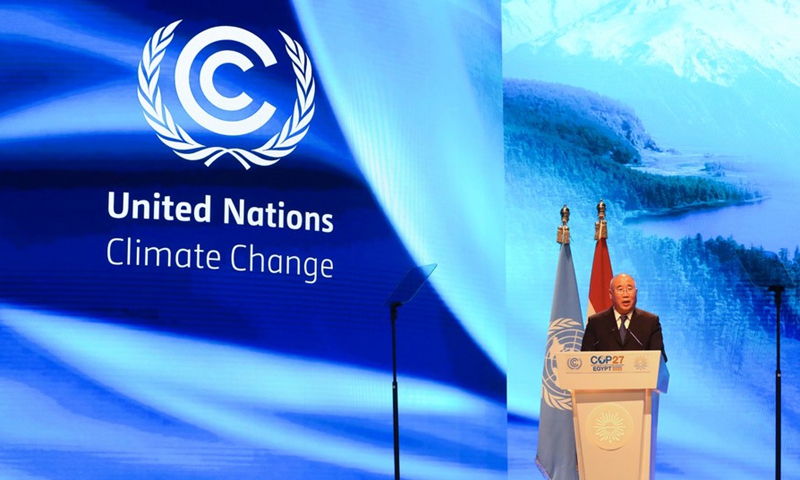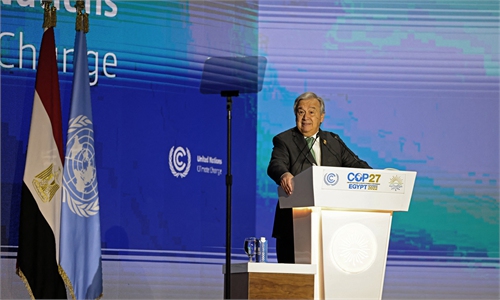
China's Special Envoy for Climate Change Xie Zhenhua addresses the Climate Implementation Summit at the COP27 in Sharm El-Sheikh, Egypt, November 8, 2022. Photo: Xinhua
While including climate compensation into the formal agenda of COP27 for the first time at global climate talks is considered a breakthrough, China's special envoy for climate change said Wednesday that China strongly supports claims from developing countries, especially the most vulnerable countries, for claiming loss and damage compensation. However, setting up a mechanism is a priority, which should follow the principle of common but differentiated responsibilities.
Despite the progress, some countries have lobbed accusations at each other, urging developing countries such as China and India to do more in compensating others. During a press conference on Wednesday, China's Special Envoy for Climate Change Xie Zhenhua said the biggest difference is that some countries support the amounts of compensation being suggested, but others are against it. They also disagree on how the loss and damage compensation should be funded.
"We hope we can find a good result through negotiations at this dialogue," Xie said.
As COP27 goes into its third day, the focus is on how developing countries can collaborate to secure more money to help their energy transitions. There are rising calls to fund more support for countries that have and will face damages from climate-fueled natural disasters, particularly since 2022 saw disastrous floods, heatwaves and hurricanes sweep across the world, in both developed and developing nations, bringing home the severity of the climate crisis to the public.
Developing and emerging countries, excluding China, need investments well beyond $2 trillion annually by 2030 if the world is to stop the global warming, according to media reports, citing a recent UN-backed report.
A trillion dollars should come from rich countries, investors and multilateral development banks, Al Jazeera reported on Wednesday. And the rest of the money - about $1.4 trillion - must originate domestically from private and public sources.
No matter how the external environment changes, China's firm determination and position to implement its goals to peak carbon emissions and achieve carbon neutrality, and to actively participate in global climate governance will never change, Xie said in an address on Tuesday.
China's commitment
As the world's second-largest economy and the biggest developing country, China has made solemn promises on carbon emission reduction goals and has been steadily advancing those goals by achieving remarkable progress in renewable energy, which Western countries cannot fault, experts said.
However, some Western countries continue pressuring developing countries like China to pay more toward the climate bill, and they will use the issue to create discord between China and other developing countries in a bid to evade their responsibilities and create more division in the international community, experts noted.
China over-fulfilled on its commitments for emissions reductions before 2020, but developed countries have not achieved their emissions reductions of 25- 40 percent as required according to commitments to the Intergovernmental Panel on Climate Change (IPCC), Xie said.
In terms of finance, developed countries pledged in 2009 in Copenhagen to provide $100 billion in climate finance every year, but now 13 years have passed, and we have not seen that money on the table, Xie said. "In total, they have an outstanding debt of a $260 billion. I think this year we should first discuss how to make sure that $100 billion finance is on the table and then also to have clear timetables and road maps for that $260 billion… to be paid."
Speaking to reporters at the COP27 venue in Sharm El-Sheik, Egypt, on Tuesday evening, Gaston Browne, the prime minister of Antigua and Barbuda, who is also the chair for Alliance of Small Island States (AOSIS), said that India and China must pay climate compensation alongside other major polluters, according to media reports.
To date, climate vulnerable countries have called on historical emitters like the US, UK and the EU to pay climate reparations.
Global climate change action faces severe challenges and developing countries are the biggest victims of climate change, Zhao Lijian, spokesperson of the Chinese Foreign Ministry, said at a routine press on Wednesday in Beijing.
China supports COP27 to make reasonable arrangements on the issue of loss and damage, which is of great concern to developing countries. We urge developed countries to seriously fulfill their historical responsibilities and international obligations, especially fulfill their promise of providing $100 billion in climate finance as soon as possible and draw a road map for doubling the adaptation finance, the spokesperson said.
From 2012 to 2021, China recorded an average annual growth of 3 percent energy consumption to achieve an average of 6.6 percent of GDP growth, while carbon dioxide emissions per unit of GDP dropped about 34.4 percent and its energy intensity fell by 26.4 percent, achieving a cumulative saving of 1.4 billion tons of standard coal, Zhao said.
Li Zhiqing, a professor in environmental economics and Chinese Economy at Fudan University, told the Global Times that while China is a major emitter of greenhouse gases, some of this can be attributed to other nations outsourcing their pollution to the country, due to China's role as an important goods manufacturer for the world.
To evaluate whether China has done enough good or needs to step up efforts, it should fully consider China's stage of development phase and its determination in investing in greening the economy, Li said.
"Our analysis showed that we need to invest about 300 to 400 trillion yuan ($41.4 trillion to $55.2 trillion) to achieve our goals, which far exceeds annual GDP," he said.
While discussions about loss and damage payments are still ongoing, some Chinese experts attending the summit said it is more important to establish this payment mechanism rather than create new divisions among countries.
"Developed countries as major historical emitters of greenhouse gases need to take a leading role in providing this funding, and if developed countries have not made any payments but instead are focused on how much developing countries could offer, it will damage the mutual trust and pose obstacles for implementing the mechanism," Li Shuo, a senior global policy adviser at Greenpeace China who is now attending the summit, told the Global Times.
China-US cooperation?
Although formal climate talks between China and the US have not resumed yet, Xie said at the Wednesday press conference that to ensure COP27 is a success, China has already started informal consultations with the US side.
Climate cooperation efforts between China and the US were singlehandedly bungled by Washington as it neglected Beijing's core interests and weaponized the climate issue to suppress China. Bilateral talks on the matter were suspended as a countermeasure by the Chinese side in response to US House Speaker Nancy Pelosi's provocative visit to the island of Taiwan in August.
Xie emphasized that the responsibility for the suspension of the climate talks is with the US side. However, even during the suspension, he and John Kerry, US special climate envoy, "are old friends for 25 years. We never stopped our personal communication."
"I don't agree with that saying that the door is now open waiting for China, but I think the door is actually closed by them," Xie said, adding that China's door is always open.
Some Chinese experts believe that resuming climate change talks between the world's biggest emitters will benefit the world, and the two sides could use the occasion for some informal communication at the technical level.
"I believe that COP27 has created an occasion for communication, as we hope to carry on some exchanges on climate change and advance cooperation for reciprocal benefits," Li Zhiqing said.

